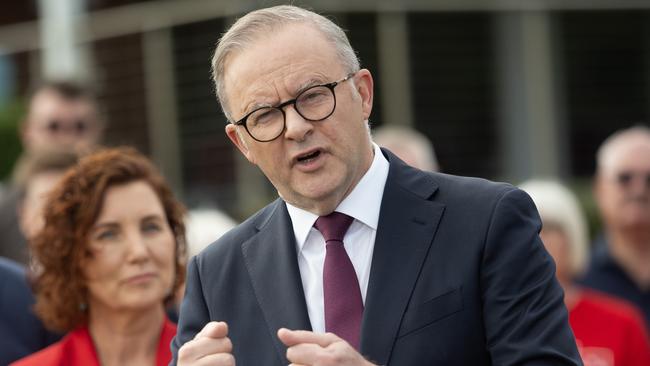Anthony Albanese says his government is taking action on closing the Indigenous gap
Anthony Albanese has declared his government is ‘taking action to close the gap on Indigenous issues’, challenging concerns from Aboriginal leaders that Labor has not moved quickly enough.

Anthony Albanese has declared his government is “taking action to close the gap on Indigenous issues”, challenging concerns from Aboriginal leaders that Labor has not moved quickly enough since the failed voice referendum to outline its next steps.
The Prime Minister is under pressure from both sides of the referendum debate to detail his “plan B” for reconciliation, with some form of road map expected to be unveiled once parliament returns next month.
He rejected the suggestion that the government wasn’t focused on closing the gap and said Labor needed to look at “new ways” to achieve it, after Noel Pearson was reported as telling the Woodford Folk Festival Mr Albanese was “running away” from Indigenous affairs.
“We’re taking action to close the gap on Indigenous issues,” Mr Albanese said.
“We responded to the request Indigenous Australians made through the Uluru Statement from the Heart in 2017 to have a referendum, giving not just constitutional recognition, but giving substance to that through a voice.
“ I was disappointed by that outcome. I took responsibility for my role in accepting that request,” Mr Albanese said.
“On Indigenous affairs we want to do what we can to close the gap in education, in health, in housing, in all of these issues, which is what the referendum was about. We accept the result though, so we have to go about it in different ways.”
Mr Albanese offered the examples of giving Indigenous Australians new education and training opportunities through the five-year national skills agreement; plans to use the Northern Australia Infrastructure Facility (NAIF) to invest in remote housing; and a $200m Housing Australia Future Fund program to repair, maintain and improve housing in remote Indigenous communities.
Opposition Indigenous Australians spokeswoman Jacinta Nampijinpa Price said it was time for Mr Albanese to “drop the Yes campaign talking points and start looking for real solutions”.
“He has no trouble listing the challenges being faced by our most marginalised Indigenous Australians, but can’t outline a plan to tackle those challenges,” the NT senator said.
“With no plan to move forward, this Prime Minister and his government are once again failing Indigenous Australians.”
Shortly after the October 14 referendum on whether to enshrine an Indigenous voice to parliament in the Constitution, The Australian revealed that the government was considering pushing ahead with local and regional voices, despite the resounding defeat. Both major parties support the concept of local and regional voices.
One option being considered by government is using and expanding the existing Empowered Communities model to act as local and regional voices across the country, possibly without the need for legislation.
While the government has made no decision on whether to pursue a Makarrata commission to oversee truth-telling and treaty-making – the two outstanding requests from the Uluru Statement from the Heart – The Australian understands that the government is prioritising practical policies such as remote housing and overhauling the work for the dole program.
Several Indigenous leaders, who wanted to remain anonymous, were concerned the government was being too slow in explaining to Australians what it would do next to help Aboriginal and Torres Strait Islander people.
The Indigenous leaders were also critical of the Coalition, saying the lack of bipartisanship at the referendum with no viable alternative had hampered progress in Indigenous affairs.
National Rural Health Alliance chief executive Susi Tegan said closing the gap could succeed only when Indigenous communities were in control and could make decisions that suited them, applauding the NAIF remote housing investment announcement.




To join the conversation, please log in. Don't have an account? Register
Join the conversation, you are commenting as Logout